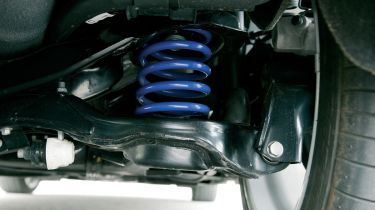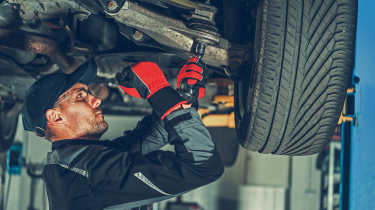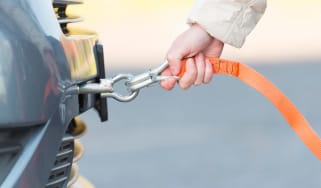Car suspension noise: what to do about creaking, clunking and other worrying sounds
An unusual noise from your car’s suspension could indicate a problem – we cover the common causes and what you should do

When it comes to car maintenance, suspension noises can be particularly worrisome. Your car’s suspension is responsible for keeping your wheels planted on the road, providing safety, stability and comfort, so it’s vital that it functions correctly.
 Limp mode: common causes and how to fix it
Limp mode: common causes and how to fix it
You might hear creaking, knocking, or other strange sounds that make you wonder if something's about to go seriously wrong. The good news is that not all suspension noises spell disaster. However, it’s crucial to understand the potential causes and take appropriate action to keep your car safe and running smoothly.
It’s worth noting that different noises often indicate different faults. In this guide, we’ll cover the most common suspension noises, the problems they relate to, as well as what to do to get it fixed.
Identifying car suspension noise
So you’ve noticed a noise coming from your car’s suspension. Before taking any further action, you should gather as much information about the issue as possible. If you take your car to a garage for repair, it’s important to give the technician as much information about the noise as possible.
It'll be much easier to diagnose the issue if you can pinpoint where the noise is coming from. A suspension problem will usually only affect one wheel at a time, so try to narrow down the noise to one of your car’s four wheels. It’s also important to determine the type of noise, as different suspension issues will create a different sound. Most suspension noises can usually be categorised as creaking, clunking or knocking.
Go for a short test drive with the windows down and make note of the conditions that cause the noise. Is the noise persistent or does it only occur over large bumps? Make sure to drive at varying speeds along a straight piece of road as well as through some corners and note when the noise occurs. Sometimes a suspension noise will only crop up when you turn the steering wheel to the right or left.
Give your car a visual inspection, too. Take a walk around the car and check if any of the corners are sagging or if any of the wheels look misaligned. If you’re able to, have a look at the suspension under the car. If any of the shock absorbers look damp, then they’re probably leaking fluid and could be the cause of your suspension noise. Check whether the springs and suspension bushes look intact – there shouldn’t be any cracks.
Common causes of suspension noises
Once you’ve narrowed down the type of noise and where and when it’s occurring, you can investigate what might be causing it.
1. Creaking noises
A creaking noise from your suspension is usually an indication of worn suspension bushes. These are small rubber components that sit within the connections between larger metal suspension components. Over time, they can wear out, crack or go brittle, creating a creaking or squeaking noise when they’re put under load – particularly over bumps or when going round corners. If one of the front suspension bushes has worn out, your steering might feel a bit vague, too.
Suspension bushes are designed to take a beating, absorbing vibrations and improving the refinement of your car. It’s fairly typical for them to need replacing in a high mileage car. Creaking bushes aren’t likely to be a serious problem immediately, but it's a sign that they probably need replacing. Ignoring it can lead to complete failure of the bushing – a significant problem that can make your car unsafe to drive.
A creaking noise can also be caused by worn ball joints. This is the joint between the suspension and the wheel, allowing the latter to pivot. If this begins to wear out, or if the seal fails and lets dirt into the joint, then it can create a creaking noise when turning.
2. Clunking or thudding noises
A clunking or thudding noise is usually more serious than a creak, but it can also be caused by a worn suspension bush or ball joint. It tends to indicate that there’s slack in the suspension that’s allowing two components to bang into each other. If a bush or ball joint has worn out, this can create additional play in the suspension, allowing two components to ‘clunk’ over bumps.
A worn out suspension strut or shock absorber can create a clunking or thudding noise, too. These components are used to support the weight of the car over bumps, but if they’re worn out, the car can ‘bottom out’ on its suspension, creating a clunk or a thud. A similar noise may occur if the strut or shock mounts have worn out.
3. Clanking noises
A clanking noise is usually indicative of metal striking metal. If the noise occurs over bumps, it’s possible that a suspension bush or ball joint has failed entirely and is allowing two metal components to come into contact. This could be more serious than a creak or a knock and should be investigated immediately.
4. Knocking noises
If you notice the noise is dependent on speed – i.e., it gets faster as the car speeds up – then there’s probably an issue with a rotating component, such as one of the driveshafts. You might hear a knocking noise when you turn the steering wheel, with the speed of the knocking increasing or decreasing with the speed of the car. Alternatively, a wheel bearing could be on the way out. This will usually be closer to a grating or clicking noise, but you’ll also notice it speeding up with the car.
What to do about suspension noises
If you notice an unusual noise from your suspension, it’s always worth having it investigated by a professional. Your suspension is vital to the safety of your car, so it’s not worth taking any risks. What starts out as a fairly minor issue can lead to a far more serious one if ignored.

Suspension issues can sometimes be tricky to diagnose, so it’s important to provide the mechanic with as much information as possible, including the type and location of the noise. They will be able to give the car a full inspection from underneath, potentially spotting an issue you wouldn’t have been able to see at home.
If you notice a change in the way your car steers, brakes or rides, you should stop driving the car until you can have the issue investigated. It also goes without saying that if you spot any visual damage to your car’s suspension – including cracked components, misaligned wheels or an excess of leaking fluid – you should not attempt to drive the car.
Frequently Asked Questions
If you notice your suspension is creaking, you should have it investigated by a professional. While it may not pose an immediate problem, it could lead to a more serious issue if left to get worse.
More on car problems
Recommended

Classic car tax exemption: which historic vehicles qualify?
Most Popular
Tips & advice

Car dashboard warning lights: what does each symbol mean?

Electric car charging stations: public networks, charger types, apps and maps








